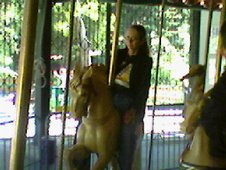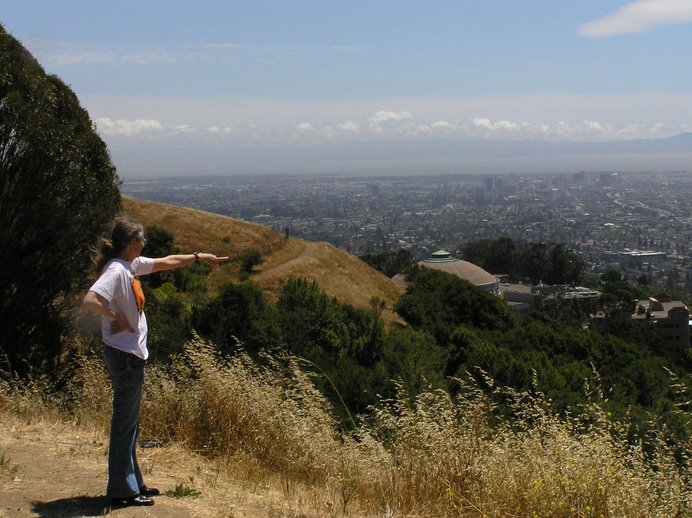
Book Expo 2009: Tracy Kidder, Craig Ferguson, Ben something-or-other & Jeanette Walls
I wasn't going to go to the Book Expo in New York City this year because I didn't have the money, but I found a free airline ticket by accident, got a room at a youth hostel and here I am. Staying in a youth hostel is weird -- imagine five sets of bunk beds stuffed into in a very small room. Imagine the Berkeley Homeless Shelter -- only occupied by college kids instead of shopping-cart pushers -- and you pretty much have the idea. It took me forever to fall asleep last night because people kept coming in and going out and flushing the toilet and turning on and off the light. But, fortunately, nobody snored.
This morning, however, I woke up exhausted. "But you gotta go to the Authors' Breakfast on Saturday," said someone I'd met the day before. "They are gonna have Craig Ferguson speak." Craig who? But I still managed to drag myself off to the Jacob Javits Center, lured on by the thought of a free breakfast and free books.
And, actually, I was glad that I did.
Craig Ferguson was the moderator of an authors'' panel consisting of him, Tracy Kidder, Jeanette Walls and somebody named Ben something-or-other. Ferguson wasn't THAT funny but here's what he said: "I'm up here with all these real writers. They don't even have any fart jokes in their books." He had just written a book called "American on Purpose". He was originally a Scot.
"Now let's listen to Tracy Kidder," Ferguson continued. "He's smarter than me too. He's probably even smarter than the New York Times."
"I went to Haiti," said Kidder, "and published a book about Paul Farmer and his Partners in Health organization. Then he took me to Moscow's Central Prison, the slums of Lima in Peru and into the highlands of Haiti. It was the tour from Hell. But the optimism that I discovered on these trips gave me a wonderful sense of hope."
I can relate to that. I survived a youth hostel and am still doing fine -- for now. But when I get back home to Berkeley, I will definitely crash. I guess people do what they have to do when they have to do it. Maybe living in Hell makes one rise to the occasion? Perhaps some small good might come out of this current Great Depression if it serves as a catalyst to finally get Americans to rise to the occasion, touch bases with the day-to-day reality of the rest of the world -- and finally get real.
Kidder, through Farmer, got introduced to a man named Deo and he was so taken with the man's story that Kidder wrote a book about him, called "Strength in What Remains". I now own three free copies of the publisher's proof of this book, BTW.
"Deo was a Tutsi from Burundi and Rwanda, scraping out a living as a grocery delivery boy in New York City after fleeing the Rwanda genocide. And after years of homelessness, Deo was finally able to enroll in Columbia University in biochemistry and philosophy. I chose to write about him because he seemed like a more universal person than Paul Farmer -- an ordinary person forced to survive in the most dangerously incredible situation -- both in Burundi and Rwanda, and in New York City. I know that under these circumstances, I myself would never have survived."
Me neither.
"When I went to Deo's village in Burundi, he told me I would be perfectly safe -- as long as I didn't take notes in public, didn't mention the words 'Tutsi' or 'Hutu' and never never said the word 'genocide'." Apparently Kidder survived because he was here today.
"No one could blame Deo for not returning to Burundi -- but he did. And he continues to do so. By 2008, Deo had started a public health and medical center, where people come in staggering numbers because there is nowhere else to go for medical care. And also people want to come to see what Americans are like. Why did Deo go back? He said, 'because you HAVE to do something'."
I totally agree with that one. Each one of us HAS to do something to make the world a better place. We just have to. It's not up to Obama or the United Nations or the ACLU or Oprah. It's all up to us.
The next speaker on the panel was Jeannette Walls. "I am just a woman with a story to tell -- but telling that story has changed my life." She wrote a book about her grandmother called "Half Broke Horses".
"If somebody could read my stories, then they would know what it's like to be poor. And also one young man who never reads books was forced by his teacher to read my book, 'The Glass Castle' and he said, 'That's a fine white trash book'. I think he meant that as a compliment."
According to Walls, "People read stories for the emotional connection they offer. People all around the country have a passion to find out about themselves and that's why they read biographies," to see how other people might have handled problems similar to their own. "People who read my first book, 'The Glass Castle,' wanted to know about my mother. Why did she make the decisions she made? And they also wanted to know why people want the things that they do."
Based on all the questions Walls had received about her mother's POV, she wanted to write another book -- just about her. "My mom would tell me stories about her past, including stories about my grandmother, and then I sat down to write a biography of my mother, but whenever I wrote about my grandmother, it seemed to just happen that my grandmother's voice took over the story. My grandmother was born in a dugout on the banks of a riverbank in 1901. She was a tough old broad and she did what she had to to get by." And so, slowly but surely, Walls' new book about her mother was taken over by her grandmother's story.
Walls is hoping that her grandmother's story will be similar to the stories that belong to her readers -- or in my case, the stories of my own grandmother and great-grandmother. "And these people are looking for someone who had gone through the same things that they went through -- looking for someone like them." Or else looking for ways to stop being like themselves and move on?
"The response to my first book was a dream come true -- so much more than anything I had ever dreamed of. And my hope is that people will recognize their own story in the story of my grandmother as well," and that this book will be a best-seller also.
I can recognize my own story in Walls' story -- I wrote two books and I want them to be best-sellers too! But nobody buys my books, although I can never understand why not. Those are excellent books! I came to the Book Expo to get free books, sure, but also to flog my own books. But so far? No luck. There are thousands of people here, also trying to flog their books. I'm just another grain of sand on the beach here. But YOU could still buy my books! "Mecca & the Hajj: Lessons from the Islamic School of Hard Knocks" is the story of what it's really like to go on Hajj. "Bring Your Own Flak Jacket: Helpful Tips for Touring Today's Middle East" is the story about what it's really like to be in Iraq, Egypt, Afghanistan, Saudi Arabia and Israel/Palestine. But I digress.
The next speaker on the panel was Ben something-or-other, author of "The Accidental Billionaires". I can't tell you for sure because he didn't give us a free book, and also Ferguson mumbled the guy's name -- or else he said it in Scottish. "I got 195 rejections on my stories," said Ben, "probably because they all took place in bars. But then I started writing medical thrillers after one publishers told me to read John Grisham, and they sold well. And then I met some geeky kids hanging out in the Crossroads Bar in Boston and they all had tons of $100 bills. How did they get them? 'We're the MIT Blackjack Team.' So I wrote a book about that. I was a fiction writer who ended up writing a non-fiction book. Kevin Spacey was in the movie version, called '21'."
They made his book into a movie? They could make MY books into a movie too!
"Then I met a geeky gawky kid who had some friends who he said had invented FaceBook. One was a hacker on the FBI hacker list. But they all had wanted to meet girls through Harvard's Finals Clubs. But, instead, one friend hacked into the Harvard computer, hacked all the girls' photos there and used them to have a hot-or-not contest -- which ended up crashing all the computers on campus and also all the campus women's groups were mad at him. But then two more friends were trying to make a dating website and needed a geek. So he thought, 'What if girls put their own photos up.' So that's how they launched FaceBook." And that's the story that Ben's new book is about.
"These guys did it so they could make their own Finals Club. Then it all exploded -- and had one million members. Getting inside this process was amazing -- that two geeks from Harvard who couldn't get girls invented the most socially interactive activity in the world."
Then we finished our breakfast -- bagels and cream cheese and orange juice -- and snagged up our free book proofs and left. And I went out to look at the rest of the Expo. It's huge. I've already got 40 pounds of free books and I still have most of Saturday and all of Sunday left.
Then I went to a seminar of how to promote one's book through a blog book tour, followed by a seminar on how to use Twitter. "There are 32 million Twitter accounts. Think about the implications -- in countries where there are cell phones but no internet connections." But apparently you gotta have a cell phone to use it. That leaves me out.
"No, you can also Tweet from your computer too." But then the speaker riffed off into technical talk and I tuned out. Heck, I can't even keep up with my e-mail inbox -- let alone 32 million Twitters. Forget that.

